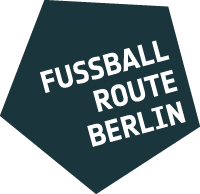2:8Plumpe
Behmstraße/Bellermannstraße
Football events and games in the northern part of Berlin move from the “Exer” to the Gesundbrunnen neighbourhood.
Not long after the turn of the century, the enterprising restaurant owner Joseph Schebera built sports fields on both sides of the Behmstraße as well as a casino and locker rooms. Thanks to this modern facility, all things football in Berlin’s northern area shifted from the “Exer” in Prenzlauer Berg to the Gesundbrunnen neighbourhood. In 1904, BFC Hertha 1892 also moved there and in its new location achieved its first successes, for example, the Berlin championship in 1906. In the 1909/1910 season, more than 17,000 spectators came to see the club’s home games. Developments on the fields in the Gesundbrunnen area were shaped predominantly by Hertha and the SV Norden-Nordwest, which had also been playing its home games on the Schebera-Platz since 1919 and later, in 1923, was to buy the site. Across the street, the popular stadium affectionately called the “Plumpe” was built in the 1920s, but the NNW fields for decades remained important for football in Berlin.
Additional topics on the information board
- Social games (“Gesellschaftsspiele”)
- Merger into Hertha BSC
- Development of the “Plumpe”
- Hertha BSC and Tennis Borussia
The team led by team captain Hanne Sobek becomes renowned throughout Germany.
Between 1926 and 1931, Hertha BSC made it six times in a row to the final round in the German football championship, and after being defeated four times in the final, the team at last won the championship in 1930 and 1931. With these wins the team led by team captain Hanne Sobek became famous in Berlin and throughout Germany. Most of the players had grown up in modest circumstances, but after their successes they were welcome guests at glamorous social events and even in Berlin’s high society. As their self-assurance grew, they showed more confidence and welcomed publicity. Their sports achievements and the public recognition they gained turned them into heroes of their time.
Additional topics on the information board
- Hertha BSC throughout Berlin
- Challenge trophy “Viktoria”
- Football under the Nazi dictatorship
Ever since the establishment of the Bundesliga, the importance of the “Plumpe” has been waning.
In 1963, Hertha BSC won the Berlin championship and thus secured place in the newly established Bundesliga. The stadium in the Gesundbrunnen neighbourhood, however, did not meet the requirements of Germany’s highest league. Therefore, the team moved its home games to the Olympic stadium, and the importance of the “Plumpe” began to wane. Still, for several more years the professional players continued to have their training sessions at the place so steeped in football tradition. Compared to the other clubs in the Federal Republic, Hertha, and football as a whole in the divided city, was in a tough position. West Berlin, walled in since 1961, was losing its economic basis. Since it was increasingly difficult for Hertha BSC’s officials to attract professional players to the city on the banks of the Spree river, they paid high signing bonuses. When these practices became known, the DFB stepped in, and Hertha lost its license for the Bundesliga and was relegated to the third division, the regional league.
Additional topics on the information board
- Aftermath of World War II
- Helmut Schön
- Scandal in the Bundesliga











